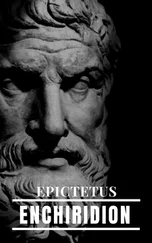3. With everything which entertains you, is useful, or of which you are fond, remember to say to yourself, beginning with the very least things, "What is its nature?" If you are fond of a jug, say, "I am fond of a jug"; for when it is broken you will not be disturbed. If you kiss your own child or wife, say to yourself that you are kissing a human being; for when it dies you will not be disturbed.
4. When you are on the point of putting your hand to some undertaking, remind yourself what the nature of that undertaking is. If you are going out of the house to bathe, put before your mind what happens at a public bath—those who splash you with water, those who jostle against you, those who vilify you and rob you. And thus you will set about your undertaking more securely if at the outset you say to yourself, "I want to take a bath, and, at the same time, to keep my moral purpose in harmony with nature." And so do in every undertaking. For thus, if anything happens to hinder you in your bathing, you will be ready to say, "Oh, well, this was not the only thing that I wanted, but I wanted also to keep my moral purpose in harmony with nature; and I shall not so keep it if I am vexed at what is going on."
5. It is not the things themselves that disturb men, but their judgements about these things. For example, death is nothing dreadful, or else Socrates too would have thought so, but the judgement that death is dreadful, this is the dreadful thing. When, therefore, we are hindered, or disturbed, or grieved, let us never blame anyone but ourselves, that means, our own judgements. It is the part of an uneducated person to blame others where he himself fares ill; to blame himself is the part of one whose education has begun; to blame neither another nor his own self is the part of one whose education is already complete.
6. Be not elated at any excellence which is not your own. If the horse in his elation were to say, "I am beautiful," it could be endured; but when you say in your elation, "I have a beautiful horse," rest assured that you are elated at something good which belongs to a horse. What, then, is your own? The use of external impressions. Therefore, when you are in harmony with nature in the use of external impressions, then be elated; for then it will be some good of your own at which you will be elated.
7. Just as on a voyage, when your ship has anchored, if you should go on shore to get fresh water, you may pick up a small shell-fish or little bulb 6on the way, but you have to keep your attention fixed on the ship, and turn about frequently for fear lest the captain should call; and if he calls, you must give up all these things, if you would escape being thrown on board all tied up like the sheep. So it is also in life: If there be given you, instead of a little bulb and a small shell-fish, a little wife and child, there will be no objection to that; only, if the Captain calls, give up all these things and run to the ship, without even turning around to look back. And if you are an old man, never even get very far away from the ship, for fear that when He calls you may be missing.
8. Do not seek to have everything that happens happen as you wish, but wish for everything to happen as it actually does happen, and your life will be serene.
9. Disease is an impediment to the body, but not to the moral purpose, unless that consents. Lameness is an impediment to the leg, but not to the moral purpose. And say this to yourself at each thing that befalls you; for you will find the thing to be an impediment to something else, but not to yourself.
10. In the case of everything that befalls you, remember to turn to yourself and see what faculty you have to deal with it. If you see a handsome lad or woman, you will find continence the faculty to employ here; if hard labour is laid upon you, you will find endurance; if reviling, you will find patience to bear evil. And if you habituate yourself in this fashion, your external impressions will not run away with you.
11. Never say about anything, "I have lost it," but only "I have given it back." Is your child dead? It has been given back. Is your wife dead? She has been given back. "I have had my farm taken away." Very well, this too has been given back. "Yet it was a rascal who took it away." But what concern is it of yours by whose instrumentality the Giver called for its return? So long as He gives it you, take care of it as of a thing that is not your own, as travellers treat their inn.
12. If you wish to make progress, dismiss all reasoning of this sort: "If I neglect my affairs, I shall have nothing to live on." "If I do not punish my slave-boy he will turn out bad." For it is better to die of hunger, but in a state of freedom from grief and fear, than to live in plenty, but troubled in mind. And it is better for your slave-boy to be bad than for you to be unhappy. Begin, therefore, with the little things. Your paltry oil gets spilled, your miserable wine stolen; say to yourself, "This is the price paid for a calm spirit, this the price for peace of mind." Nothing is got without a price. And when you call your slave-boy, bear in mind that it is possible he may not heed you, and again, that even if he does heed, he may not do what you want done. But he is not in so happy a condition that your peace of mind depends upon him. 7
13. If you wish to make progress, then be content to appear senseless and foolish in externals, do not make it your wish to give the appearance of knowing anything; and if some people think you to be an important personage, distrust yourself. For be assured that it is no easy matter to keep your moral purpose in a state of conformity with nature, and, at the same time, to keep externals; but the man who devotes his attention to one of these two things must inevitably neglect the other.
14. If you make it your will that your children and your wife and your friends should live for ever, you are silly; for you are making it your will that things not under your control should be under your control, and that what is not your own should be your own. In the same way, too, if you make it your will that your slave-boy be free from faults, you are a fool; for you are making it your will that vice be not vice, but something else. If, however, it is your will not to fail in what you desire, this is in your power. Wherefore, exercise yourself in that which is in your power. Each man's master is the person who has the authority over what the man wishes or does not wish, so as to secure it, or take it away. Whoever, therefore, wants to be free, let him neither wish for anything, nor avoid anything, that is under the control of others; or else he is necessarily a slave.
15. Remember that you ought to behave in life as you would at a banquet. As something is being passed around it comes to you; stretch out your hand and take a portion of it politely. It passes on; do not detain it. Or it has not come to you yet; do not project your desire to meet it, but wait until it comes in front of you. So act toward children, so toward a wife, so toward office, so toward wealth; and then some day you will be worthy of the banquets of the gods. But if you do not take these things even when they are set before you, but despise them, then you will not only share the banquet of the gods, but share also their rule. For it was by so doing that Diogenes and Heracleitus, and men like them, were deservedly divine and deservedly so called.
16. When you see someone weeping in sorrow, either because a child has gone on a journey, or because he has lost his property, beware that you be not carried away by the impression that the man is in the midst of external ills, but straightway keep before you this thought: "It is not what has happened that distresses this man (for it does not distress another), but his judgement about it." Do not, however, hesitate to sympathize with him so far as words go, and, if occasion offers, even to groan with him; but be careful not to groan also in the centre of your being.
Читать дальше












